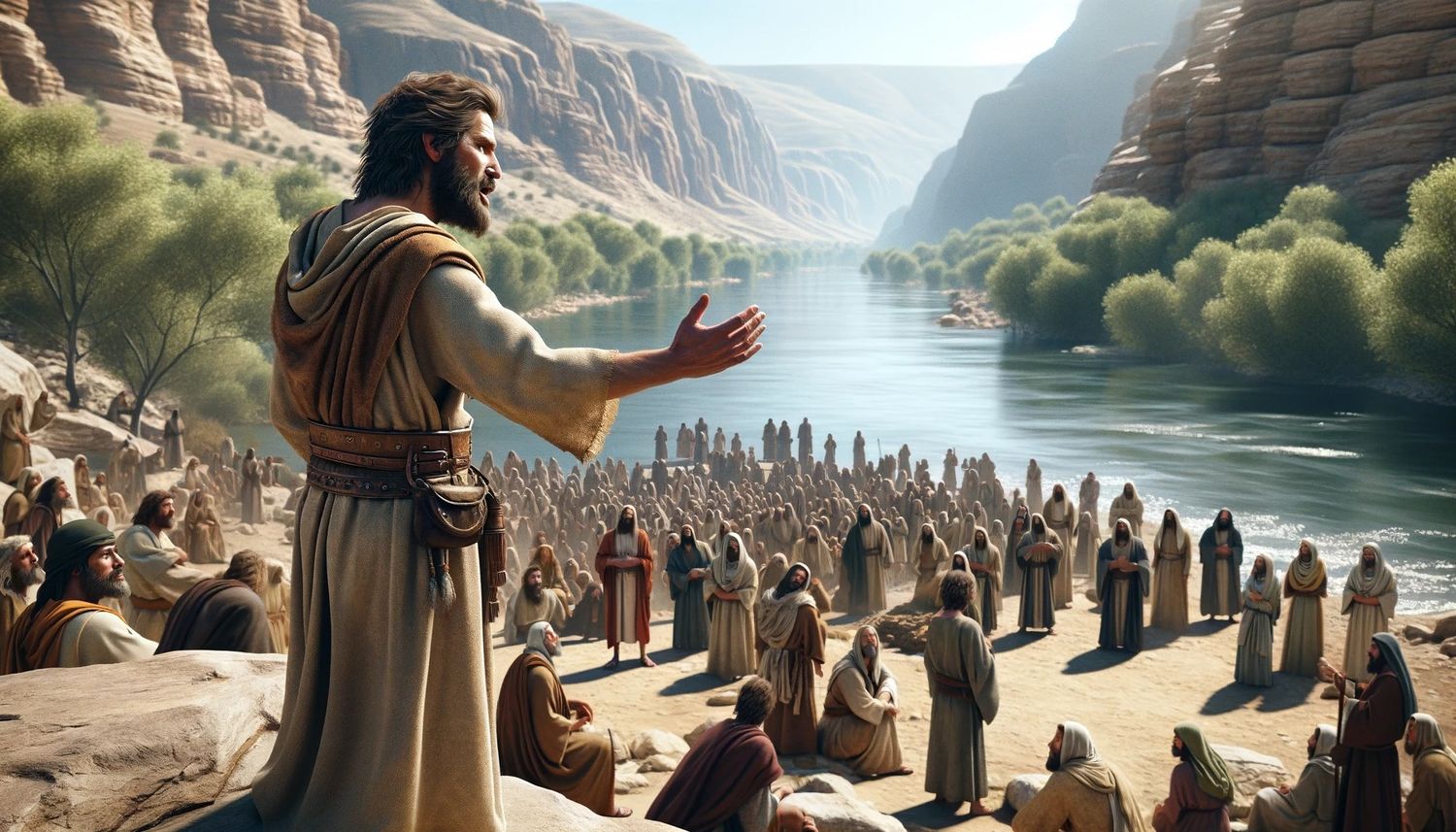Home>Theology and Spirituality>Why Did John The Baptist Question Whether Jesus Was The Messiah


Theology and Spirituality
Why Did John The Baptist Question Whether Jesus Was The Messiah
Published: February 22, 2024
Jason DeRose, Managing Editor at Christian.net, uses his expertise in religion and journalism to deepen understanding of faith's societal impacts. His editorial leadership, coupled with a strong academic background, enriches the platform’s diverse content, earning him recognition in both journalism and religious circles.
Discover why John the Baptist questioned Jesus as the Messiah and explore the theological implications of this pivotal moment in Christian history. Gain insights into theology and spirituality.
(Many of the links in this article redirect to a specific reviewed product. Your purchase of these products through affiliate links helps to generate commission for Christian.net, at no extra cost. Learn more)
Table of Contents
Introduction
The story of John the Baptist questioning whether Jesus was the Messiah is a compelling and thought-provoking episode in the New Testament. It delves into the complexities of faith, doubt, and the human experience of grappling with profound spiritual truths. This pivotal moment not only sheds light on the character of John the Baptist but also offers profound insights into the nature of Jesus' ministry and the expectations surrounding the long-awaited Messiah.
The encounter between John the Baptist and Jesus serves as a poignant reminder that even the most steadfast believers may experience moments of uncertainty and questioning. This narrative resonates with individuals across diverse spiritual backgrounds, as it speaks to the universal human experience of wrestling with profound existential and spiritual questions.
As we delve into the background of John the Baptist and the ministry of Jesus, we will gain a deeper understanding of the context in which this pivotal interaction took place. Exploring the doubt that John the Baptist expressed and Jesus' response to his question will provide valuable insights into the complexities of faith and the profound significance of this exchange. Ultimately, this exploration will illuminate the timeless relevance of this narrative and its enduring impact on the understanding of Jesus' identity and mission.
The Background of John the Baptist
John the Baptist, a central figure in the New Testament, emerged as a pivotal prophetic voice in the Judean wilderness during the first century. His background and upbringing were deeply intertwined with the rich tapestry of Jewish religious and cultural traditions, shaping his identity and mission.
Born to elderly parents, Zechariah and Elizabeth, John's miraculous conception was foretold by the angel Gabriel, signaling his extraordinary destiny from the outset. His birth was met with astonishment, as his father, Zechariah, regained his speech after nine months of silence, affirming the divine significance of John's arrival.
Raised in the wilderness of Judea, John led a life of asceticism and spiritual devotion, drawing inspiration from the prophetic traditions of ancient Israel. His distinctive attire of camel's hair and a leather belt, coupled with a diet of locusts and wild honey, reflected his renunciation of worldly comforts and his unwavering commitment to his prophetic calling.
John's ministry was characterized by a fervent call to repentance and spiritual renewal, echoing the prophetic voices of the Old Testament. His impassioned preaching resonated with the Jewish populace, compelling them to undergo ritual immersion in the waters of the Jordan River as a symbol of their repentance and readiness for the coming of the Messiah.
As a prophetic forerunner, John's proclamation of the imminent arrival of the Messiah stirred widespread anticipation and fervent expectation among the Jewish community. His unwavering commitment to his divine mandate and his uncompromising stance against religious hypocrisy and moral complacency earned him a reputation as a fearless and uncompromising prophet.
John's profound impact transcended societal boundaries, drawing crowds from diverse backgrounds, including tax collectors, soldiers, and ordinary citizens. His message of ethical integrity and spiritual transformation resonated deeply with those who sought genuine spiritual renewal and a deeper connection with their faith.
The profound influence of John the Baptist reverberated throughout the region, setting the stage for the transformative encounter between John and Jesus, which would ultimately shape the course of both their ministries and the trajectory of religious history.
John's background, characterized by divine intervention, prophetic calling, and unwavering commitment to his mission, laid the foundation for his pivotal role in preparing the hearts and minds of the people for the arrival of the long-awaited Messiah.
The Ministry of Jesus
The ministry of Jesus, as depicted in the New Testament, embodies a profound and transformative period characterized by compassion, healing, and the proclamation of the Kingdom of God. His ministry unfolded against the backdrop of first-century Judea, a time marked by religious fervor, social upheaval, and the yearning for spiritual renewal.
Central to Jesus' ministry was his unwavering commitment to proclaiming the imminent arrival of the Kingdom of God, a message that resonated deeply with the marginalized and disenfranchised members of society. His teachings, often conveyed through parables and profound ethical insights, challenged conventional norms and offered a radical vision of spiritual renewal and social justice.
At the heart of Jesus' ministry lay his profound compassion and healing ministry, which transcended societal barriers and touched the lives of countless individuals. His miraculous healings, ranging from physical ailments to spiritual afflictions, served as tangible manifestations of divine grace and the restoration of wholeness.
Furthermore, Jesus' ministry was characterized by his radical inclusivity, as he extended compassion and acceptance to those marginalized by society, including tax collectors, sinners, and the socially ostracized. His transformative encounters with individuals such as the Samaritan woman at the well, the woman caught in adultery, and the compassionate embrace of children exemplified his unwavering commitment to inclusivity and the affirmation of human dignity.
The profound impact of Jesus' ministry reverberated throughout the region, drawing multitudes who sought solace, healing, and spiritual renewal. His teachings, often delivered with profound wisdom and compassion, challenged the religious establishment and offered a compelling vision of spiritual authenticity and ethical integrity.
Moreover, Jesus' ministry was marked by transformative acts of compassion, such as feeding the multitudes, walking on water, and calming the storm, which served as powerful demonstrations of divine authority and the manifestation of the Kingdom of God in the midst of human frailty and uncertainty.
Overall, the ministry of Jesus transcended conventional religious paradigms, offering a radical vision of spiritual renewal, social justice, and the transformative power of divine love. His profound teachings, compassionate outreach, and miraculous acts continue to inspire and challenge individuals across diverse spiritual traditions, underscoring the enduring relevance and transformative impact of his ministry.
The Doubt of John the Baptist
Amidst the fervent anticipation surrounding the arrival of the Messiah, John the Baptist, who had fearlessly proclaimed the imminent coming of the long-awaited deliverer, found himself grappling with doubt. The circumstances that led to this pivotal moment of uncertainty were rooted in the profound complexities of human experience and the enigmatic nature of divine fulfillment.
Imprisoned by Herod Antipas, John faced the stark reality of confinement and adversity, which starkly contrasted with the grand expectations associated with the Messiah's arrival. The harshness of his circumstances likely prompted introspection and contemplation, leading to a moment of profound questioning regarding the identity and mission of Jesus.
John's doubt, though unexpected given his unwavering commitment to his prophetic calling, reflects the depth of human vulnerability and the profound impact of adversity on faith. His interrogation of whether Jesus was the long-awaited Messiah stemmed from a place of genuine perplexity, as the disparity between his predicament and the anticipated arrival of the Messiah prompted profound existential and theological introspection.
This moment of doubt, far from diminishing John's stature as a prophetic figure, underscores the authenticity of his human experience and the depth of his spiritual journey. It serves as a poignant reminder that even the most steadfast believers may grapple with uncertainty in the face of adversity and unfulfilled expectations.
The doubt expressed by John the Baptist resonates with individuals across diverse spiritual backgrounds, as it encapsulates the universal human experience of confronting profound existential and spiritual questions. It humanizes the revered figure of John, portraying him as a relatable and empathetic figure who navigated the complexities of faith amidst adversity and uncertainty.
Ultimately, John's doubt serves as a testament to the profound complexities of faith and the enigmatic nature of divine fulfillment. It invites contemplation on the intricate interplay between human vulnerability and unwavering faith, shedding light on the universal human experience of grappling with profound existential and spiritual questions in the midst of adversity.
Jesus' Response to John's Question
In response to John the Baptist's disciples conveying his doubts about Jesus' identity as the Messiah, Jesus offered a profound and multifaceted response that transcended mere verbal affirmation. He demonstrated the authenticity of his messianic mission through tangible acts of compassion, healing, and the proclamation of the Kingdom of God.
Jesus' response began with a compassionate acknowledgment of John's disciples and their pivotal role in conveying John's inquiry. Rather than dismissing or rebuking John for his doubt, Jesus extended understanding and compassion, affirming the legitimacy of John's question while simultaneously offering profound insights into the nature of his messianic mission.
Central to Jesus' response was the tangible demonstration of his messianic identity through miraculous healings, compassionate outreach to the marginalized, and the proclamation of the Kingdom of God. He directed John's disciples to bear witness to the transformative acts they had witnessed, affirming the fulfillment of messianic prophecies and the tangible manifestation of divine grace in the midst of human suffering and adversity.
Moreover, Jesus' response encompassed a profound affirmation of John's prophetic role and significance in preparing the hearts and minds of the people for the arrival of the Messiah. By highlighting John's pivotal role as the prophetic forerunner, Jesus underscored the continuity between John's prophetic proclamation and the unfolding fulfillment of messianic prophecies in his own ministry.
Furthermore, Jesus' response served as a compelling invitation to contemplation and discernment, as he emphasized the blessedness of those who do not stumble because of him. This nuanced acknowledgment of the complexities of faith and doubt conveyed Jesus' profound understanding of the human experience and the intricate interplay between unwavering faith and moments of uncertainty.
Ultimately, Jesus' response to John's question transcended mere verbal reassurance, offering a transformative invitation to bear witness to the tangible manifestations of divine grace and the fulfillment of messianic prophecies in the midst of human frailty and uncertainty. His response underscored the profound significance of his messianic mission and the enduring impact of John the Baptist's prophetic proclamation in preparing the hearts and minds of the people for the arrival of the long-awaited Messiah.
Read more: Why Did Jesus Not Save John The Baptist
The Significance of John's Question
John the Baptist's profound question regarding Jesus' identity as the Messiah holds immense significance within the broader theological and spiritual context of the New Testament narrative. This pivotal moment encapsulates the complexities of faith, doubt, and the human experience of grappling with profound existential and spiritual truths. The significance of John's question reverberates across diverse spiritual traditions, inviting contemplation on the intricate interplay between unwavering faith and moments of uncertainty.
At its core, John's question serves as a poignant reminder of the universal human experience of confronting profound existential and spiritual questions. It humanizes the revered figure of John, portraying him as a relatable and empathetic figure who navigated the complexities of faith amidst adversity and uncertainty. This relatability resonates with individuals across diverse spiritual backgrounds, as it encapsulates the universal human experience of grappling with profound existential and spiritual questions in the midst of adversity.
Furthermore, the significance of John's question lies in its capacity to illuminate the depth of human vulnerability and the enigmatic nature of divine fulfillment. John's doubt, far from diminishing his stature as a prophetic figure, underscores the authenticity of his human experience and the depth of his spiritual journey. It serves as a testament to the profound complexities of faith and the universal human experience of grappling with profound existential and spiritual questions in the midst of adversity.
Moreover, John's question serves as a catalyst for profound introspection and contemplation, inviting individuals to confront their own moments of doubt and uncertainty within their spiritual journey. It underscores the transformative potential of doubt as a catalyst for deeper spiritual insight and reaffirms the authenticity of the human experience in navigating the complexities of faith.
Ultimately, the significance of John's question extends beyond the confines of historical narrative, offering timeless insights into the human experience of faith, doubt, and the enduring quest for spiritual truth. It invites individuals to embrace the complexities of their own spiritual journey, recognizing that moments of doubt and uncertainty are integral facets of the profound tapestry of faith and the human experience.














